In 2025, marketing teams are building entire campaigns using AI marketing automation tools. Platforms like Salesforce Marketing Cloud, Adobe Marketo Engage, and HubSpot AI now manage audience targeting, content selection, timing, and delivery with minimal manual input. One model can decide who to reach, what message to send, when to send it, and where to deliver it—cutting campaign setup time from weeks to hours.
AI marketing automation tools are now a core part of enterprise tech stacks. According to Forbes, over 74% of marketers use AI to drive decision-making, and 90% report measurable productivity gains. The global market for marketing automation is projected to grow from $6.9 billion in 2024 to $17.3 billion by 2032, driven by AI-powered personalization and real-time analytics.
In this blog, we’ll break down how AI marketing automation tools work, where they’re making the most significant impact, and how businesses can use them to improve efficiency, reduce costs, and boost campaign performance.
What Are AI Marketing Automation Tools
AI marketing automation tools are platforms that use artificial intelligence to automate repetitive marketing tasks, personalize customer interactions, and improve campaign performance. These tools go beyond rule-based automation. They learn from data, predict outcomes, and adjust their actions in real-time.
They help marketing teams save time, reduce manual work, and make smarter decisions. Instead of sending the same email to everyone, AI tools segment audiences, pick the best time to send, and even write the message. They also track performance and suggest changes to improve results.
These tools are now used across email marketing, content creation, lead scoring, social media, and customer support. They’re built to scale with your team and adapt to changing customer behavior.
Automate your marketing smarter with AI-driven solutions.
Partner with Kanerika for expert implementation and long-term success.
Top AI Marketing Automation Tools in 2026
1. HubSpot
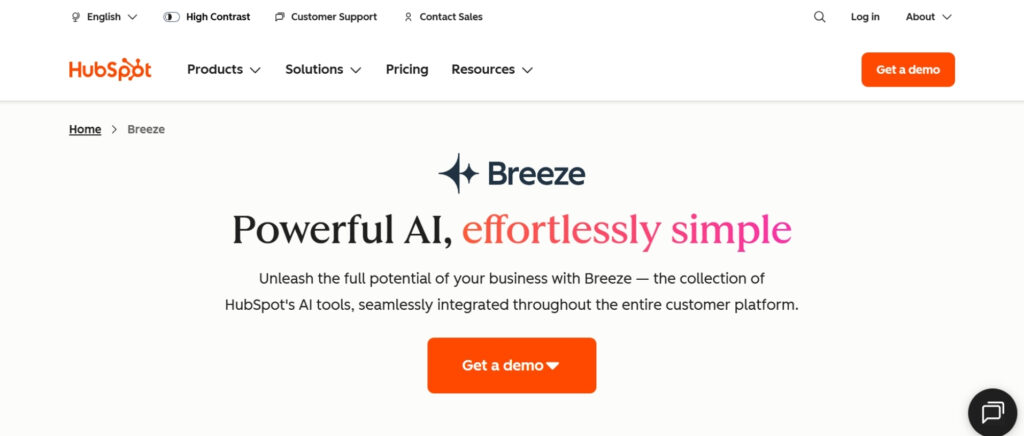
HubSpot combines CRM functionality with AI-powered marketing automation, serving as a central hub for all customer interactions while leveraging AI to optimize campaign performance.
The platform tracks every customer touchpoint, including emails, social media interactions, website visits, and sales communications, building detailed profiles that guide personalization and engagement. Its AI engine analyzes behavior to identify high-potential leads and recommend the best times to connect with prospects.
Key Features:
- AI content writer for blogs, emails, and social media
- Smart lead scoring based on engagement and company data
- Predictive analytics to forecast deal outcomes
- Personalized website content for different visitor segments
Benefits: HubSpot eliminates manual lead qualification, accelerates content creation, and helps sales teams focus on high-potential prospects. Marketing campaigns benefit from automated optimization and personalized engagement strategies.
Use Case: Best for B2B companies needing comprehensive lead management and nurturing, particularly with complex sales cycles.
Pricing: Free plan; Starter $45/month; Professional and Enterprise $800–$3,600/month depending on contacts and features.
2. Jasper
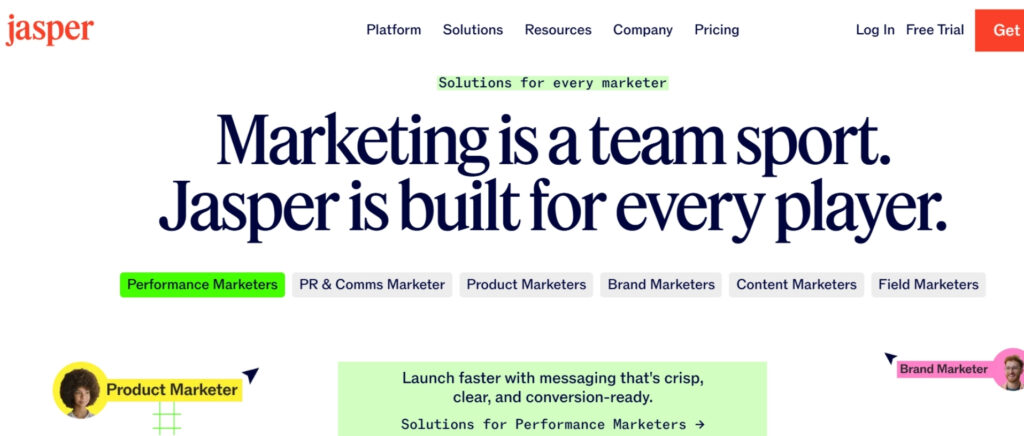
Jasper is an AI-powered content platform that generates high-quality written content aligned with brand voice, for blogs, emails, social media, and ads.
The AI learns from your existing content and style guides to create messages that are consistent, engaging, and audience-appropriate. Jasper streamlines content creation while maintaining quality and brand identity.
Key Features:
- Brand voice training to maintain messaging consistency
- Long-form content creation with contextual understanding
- Template library for various content types
- Multi-language support for global campaigns
Benefits: Teams can produce more content with fewer resources, ensuring consistent messaging across channels. Writers focus on strategy while AI handles repetitive content generation.
Use Case: Ideal for content marketing teams or agencies managing multiple clients with distinct brand voices.
Pricing: Creator plan $39/month for 50,000 words; Teams plan $99/month for 100,000 words; Business plans start at $500/month.
3. Zapier
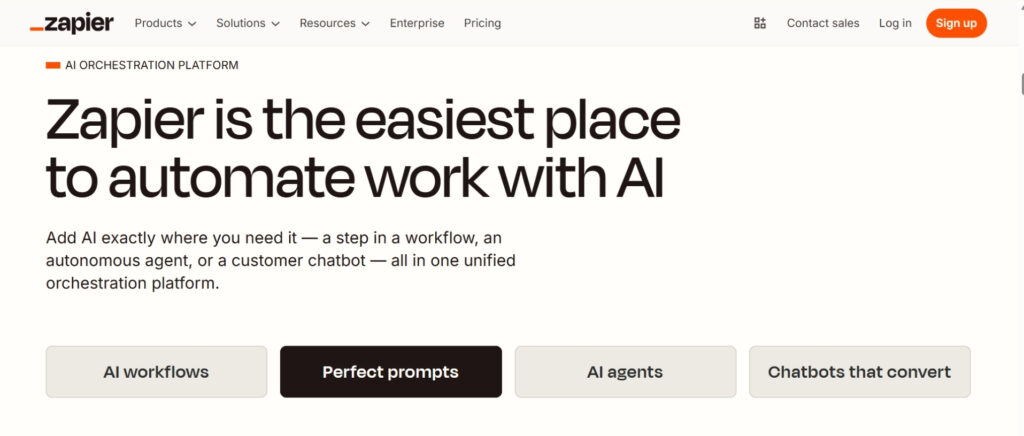
Zapier automates workflows by connecting apps and moving data seamlessly, reducing manual effort and errors. Its AI suggests relevant automations and helps teams build complex workflows efficiently.
Key Features:
- AI workflow suggestions based on app usage
- Conditional logic for customized automation paths
- Webhook support for custom integrations
Benefits: Zapier eliminates repetitive data entry, ensures smooth information flow, and increases team productivity. AI-powered suggestions simplify workflow creation, making automation accessible even for complex processes.
Use Case: Ideal for marketing operations teams needing seamless integration across multiple tools, especially in best-of-breed software ecosystems.
Pricing: Free plan; Starter $20/month; Professional and Team $49–$399/month depending on usage.
4. Delve AI
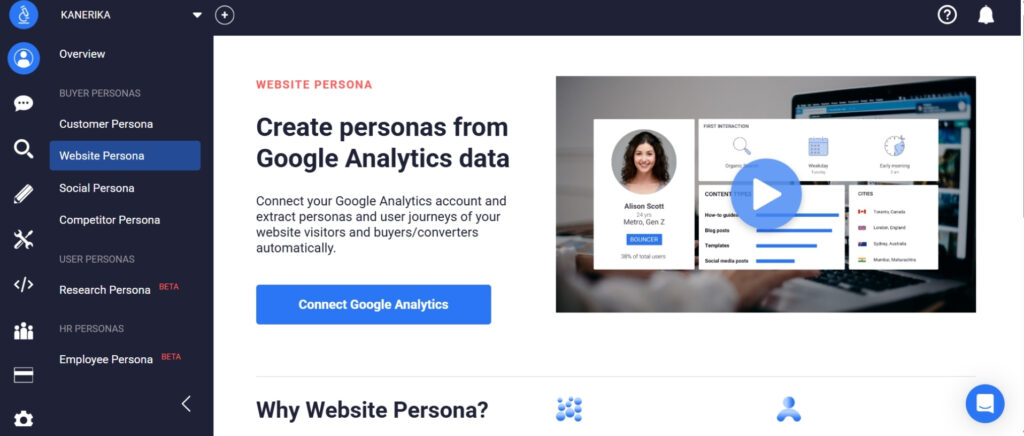
Delve AI uses machine learning to create detailed customer personas, providing insights into behavior, preferences, and motivations. It also examines competitors’ audiences to inform marketing strategy.
Key Features:
- Automatic persona generation from customer data
- Behavioral segmentation to target audiences effectively
- Predictive modeling for future customer behavior
Benefits: Campaigns become more precise and effective. Deep insights inform product development and competitive strategies, while customer acquisition costs decrease through better targeting.
Use Case: Valuable for e-commerce and SaaS companies seeking a deeper understanding of their customers and market positioning.
Pricing: Live Persona $99/month; Social Persona $199/month; custom enterprise solutions available.
AI in Robotics: Pushing Boundaries and Creating New Possibilities
Explore how AI in robotics is creating new possibilities, enhancing efficiency, and driving innovation across sectors.
5. Surfer SEO
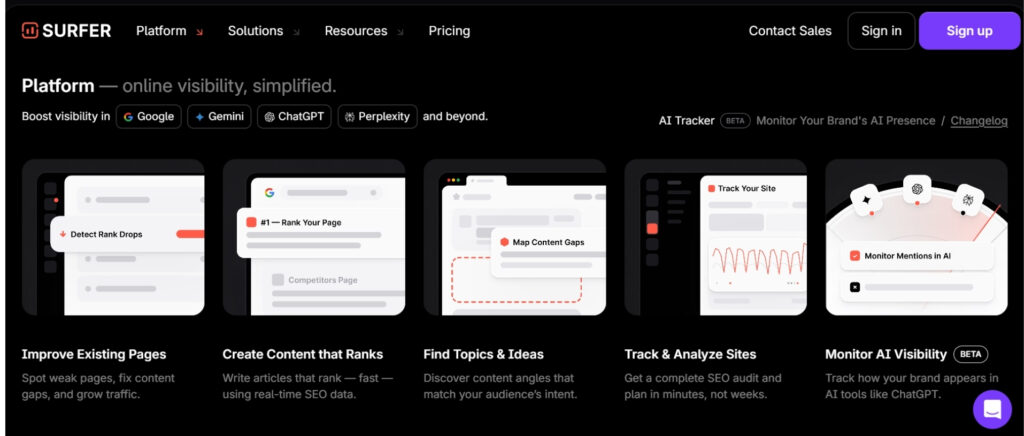
Surfer SEO optimizes content for search engines by analyzing top-ranking pages using AI. It guides marketers with actionable recommendations for keyword usage, content structure, and optimization strategy.
Key Features:
- Real-time content editor with optimization suggestions
- SERP analysis to benchmark against top-ranking pages
- Content audit to identify improvement opportunities
Benefits: Surfer SEO boosts organic search rankings through data-driven recommendations. Teams save time by focusing on content that meets both user intent and search engine requirements.
Use Case: Essential for content marketing teams focused on organic traffic and search engine visibility.
Pricing: Basic $89/month (30 articles); Pro $179/month (100 articles); Business $299/month (300 articles).
6. Grammarly
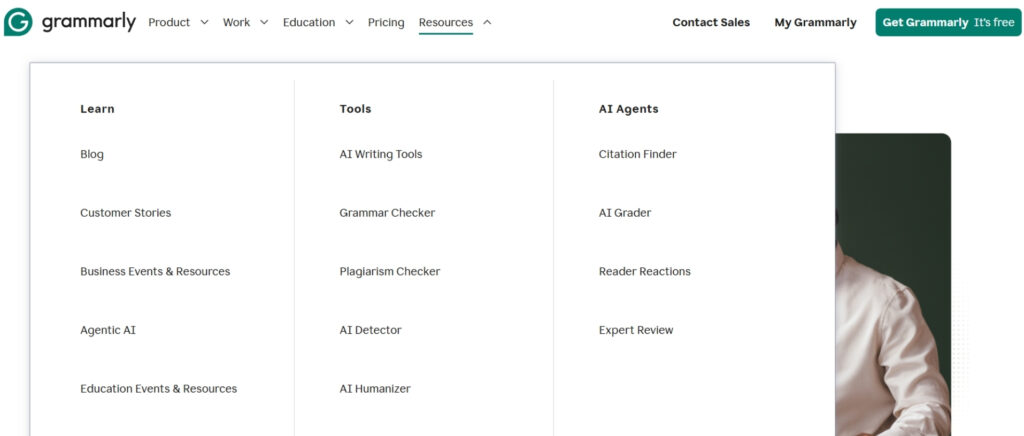
Grammarly offers AI-powered writing assistance to ensure clarity, professionalism, and consistency of brand voice across all content.
Key Features:
- Advanced grammar and style suggestions
- Brand voice consistency for teams
- Tone detection to match audience and purpose
Benefits: Writing quality improves across teams, brand messaging stays consistent, and editing time decreases, allowing content teams to focus on strategy rather than corrections.
Use Case: Ideal for organizations producing large volumes of written content or teams that need consistent messaging across multiple writers.
Pricing: Free version; Premium $12/month; Business $15/user/month.
7. Creatio
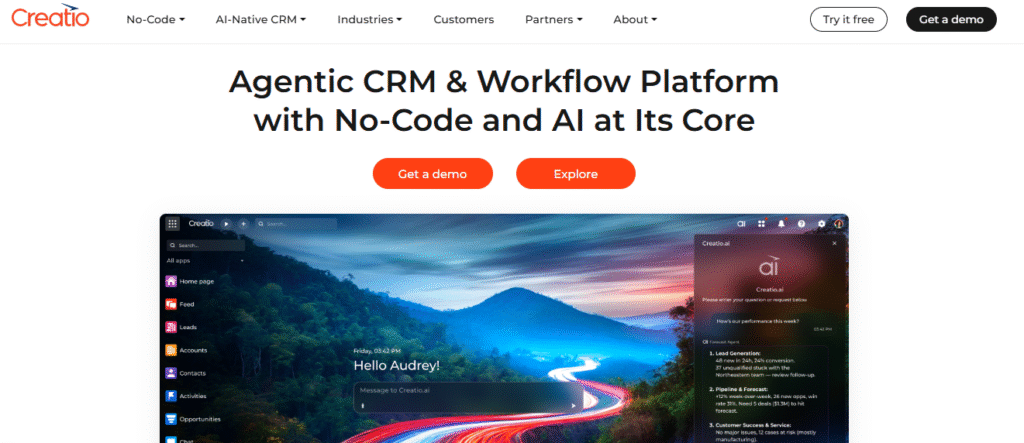
Creatio is an AI-native marketing automation platform that helps teams streamline lead management, personalize campaigns, and accelerate the lead-to-revenue cycle. Its embedded generative, predictive, and agentic AI automates content creation, email workflows, and lead qualification, while delivering full context from a real-time customer 360 profile. The no-code tools allow marketers to adapt processes, build custom workflows, and create new AI agents without technical expertise.
Key Features:
- Ready-to-use AI agents for real-time lead scoring, brand tone-aligned email generation, and templates for campaigns
- Customer 360 with omnichannel engagement history
- Automated lead lifecycle management
- No-code customization and AI agent builder
Benefits: Creatio reduces manual workload, improves personalization, and speeds up campaign execution. Marketers can quickly design and optimize complex workflows using AI assistance and visual no-code tools.
Use Case: Best for mid-size and enterprise teams looking to automate multi-channel campaigns, improve lead conversion, and leverage customizable AI agents without relying on IT.
Pricing: Growth $25/user/month; Enterprise $55; Unlimited $85. Marketing product license $15/user/month with AI agents included. Free trial and demos available.
8. Drift
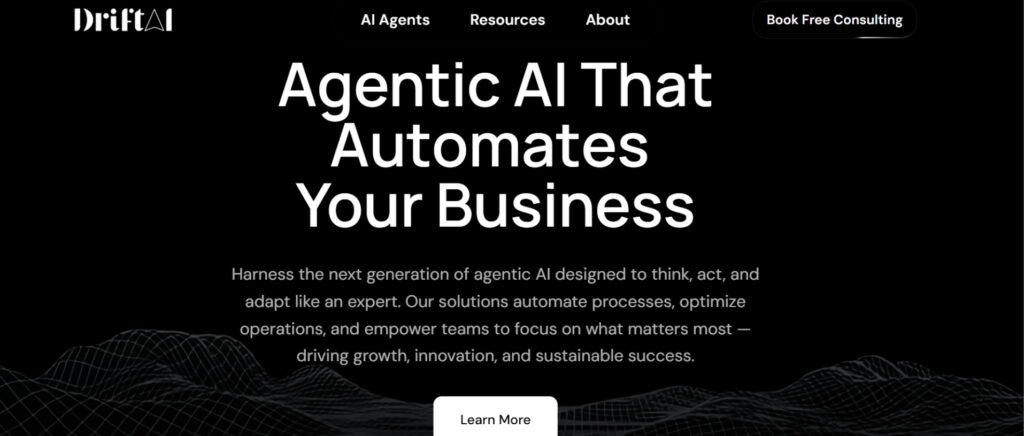
Drift provides AI-powered conversational marketing through chatbots and live chat, engaging visitors, qualifying leads, and scheduling meetings automatically.
Key Features:
- Conversational AI for instant engagement
- Lead qualification through tailored questions
- Integration with calendars and CRM systems
Benefits: Drift improves lead conversion rates with immediate engagement. Sales teams receive qualified leads, while customers enjoy faster responses. Marketing attribution becomes clearer through detailed conversation tracking.
Use Case: Best for B2B websites looking to convert visitors into qualified leads, especially in software or professional services.
Pricing: Premium $2,500/month; Advanced and Enterprise require custom quotes.
9. Google Opal
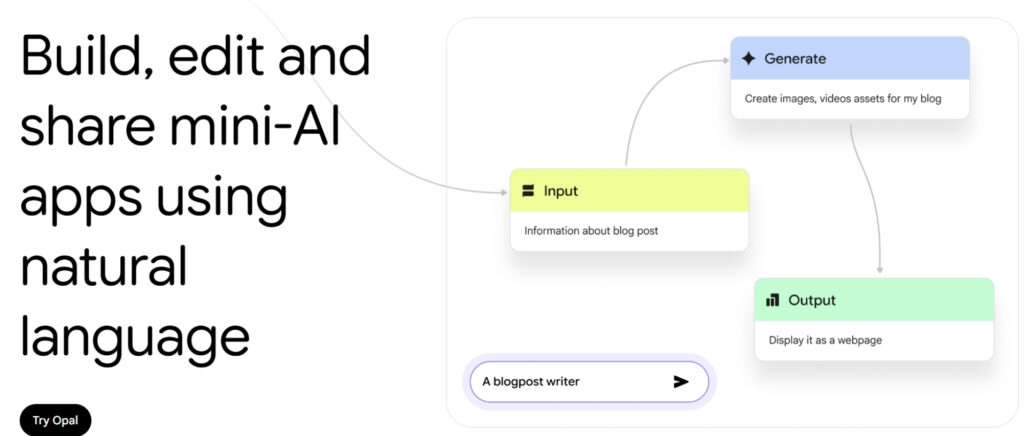
Google Opal is an experimental no-code platform that lets users build and share AI-powered mini-apps using natural language. It’s designed for creators, marketers, and teams who want to prototype AI workflows without writing code.
Key Features
• Visual editor for building AI workflows
• Natural language prompts to define app logic
• Shareable mini-apps with Google account access
Benefits
Opal makes it easy to turn ideas into working AI tools. Teams can build internal utilities, content generators, or customer-facing tools without engineering support. It’s fast, flexible, and ideal for early-stage experimentation.
Use Case
Best for marketers, product teams, and creators looking to test AI-powered ideas or automate simple tasks without coding.
Pricing
Free (currently in experimental beta)
10. Improvado
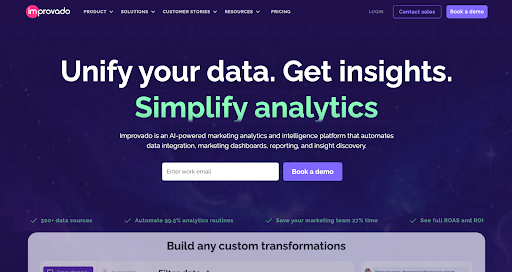
Improvado is an AI-powered marketing analytics and data automation platform that helps teams automate the collection, unification, and analysis of marketing data across channels. Instead of manually exporting reports or reconciling metrics, Improvado automates marketing data workflows so teams can monitor performance, measure ROI, and make faster decisions at scale.
The platform connects advertising platforms, CRM systems, and analytics tools into a centralized data model. Its AI capabilities support automated data normalization, anomaly detection, and natural-language analytics, reducing the operational overhead typically associated with marketing reporting and performance tracking.
Key Features:
- Automated data pipelines from advertising, CRM, and analytics platforms
- AI-powered data normalization and metric standardization
- Natural-language queries for marketing performance analysis
- Cross-channel reporting and attribution support
- Integration with BI tools and cloud data warehouses
Benefits:
Improvado eliminates manual reporting processes and reduces data inconsistencies across marketing systems. Teams gain faster access to reliable performance insights, enabling better budget allocation, clearer ROI measurement, and more confident optimization decisions without relying heavily on technical resources.
Use Case:
Best for mid-size and enterprise marketing teams that manage multiple channels and tools and need automated, accurate reporting and analytics to support decision-making, forecasting, and performance optimization.
Pricing:
Custom pricing based on data sources, scale, and usage; demos available on request.
How We Use AI to Scale Marketing Operations
We have been testing AI marketing tools for two years. Here’s our current stack and what actually moves the needle.
1. Content Production
Claude handles our blog outlines and first drafts. We have defined our brand guidelines and customer pain points, and then edited everything before publishing. Additionally, ChatGPT assists with creating social media captions and variations for email subject lines.
Jasper generates website page descriptions and ad copy at scale. For hundreds of web pages, it saves weeks of writing time. However, we continually review our content for accuracy and consistency with our brand voice.
2. Video and Visual Content
Veed.io processes all our video content. We utilize it for automated captions, resizing content for various platforms, and creating short clips from longer videos. The AI automatically removes filler words and awkward pauses.
Midjourney creates custom graphics when stock photos look generic. We prompt it with specific brand colors and style guidelines. Agreed, it takes practice to get consistent results.
3. SEO and Analytics
Clearscope analyzes our content gaps and suggests opportunities for optimization. It shows which keywords competitors rank for that we don’t. We build content calendars around these insights. Additionally, Claude assists with on-page optimizations.
MarketMuse maps our entire content strategy. It identifies thin content that needs updating and topic clusters we should develop. Saves hours of manual keyword research.
4. Process Automation
This is my personal favorite. Zapier connects everything. When Claude finishes a blog post, it automatically sends it to Grammarly, then creates a task in Asana for our designer to add visuals.
Make.com handles more complex workflows. The customer signs up, gets tagged in our CRM, receives a personalized email sequence, and is added to the appropriate nurture campaigns.
5. Performance Tracking
I utilize AI-powered analytics tools to identify patterns that humans may miss. Which subject lines perform best? What content topics drive the most conversions? The data guides my strategy decisions.
AI excels at handling large volumes of tasks and recognizing patterns. I produce 3x more content than before. My team focuses on strategy instead of execution grunt work. But every AI output needs human review. The tools are assistants, not replacements. I still make all strategic decisions about messaging, positioning, and campaign direction.
6. The Real ROI
My content production costs dropped 40%. Campaign setup time is cut in half. But I spent 6 months learning these tools and training my team. The learning curve is steep.
The bottom line is that AI multiplies human capabilities. It doesn’t replace marketing expertise. The teams winning with AI combine smart automation with strong strategic thinking.
How Kanerika’s AI Solution Transforms Business Operations
Kanerika helps marketing teams move beyond basic automation. We build AI-driven systems that reduce manual work, improve targeting, and make campaigns more responsive. Our focus is on creating workflows that adapt to customer behavior in real time, not just follow static rules. From predictive analytics to automated content creation, we ensure that your marketing efforts are efficient, impactful, and aligned with your business goals.
Our team works closely with clients to understand their data, platforms, and processes. We design automation that seamlessly integrates into existing systems and scales with your growth. From setting up AI models to integrating them with CRM and analytics, we handle the technical side so your team can focus on strategy. We also assist with reporting and insights, making it easier to track performance and make adjustments quickly.
What sets us apart is our focus on measurable results and actionable intelligence. Our solutions are built to scale with your business, adapting as customer behavior and market dynamics evolve. Our clients see faster campaign execution, better engagement, and more efficient workflows. If your team is ready to use AI to simplify marketing and get better results, Kanerika can help make that happen.
Transform campaigns with data-driven AI automation.
Partner with Kanerika for measurable success.
FAQs
1. What are AI marketing automation tools and how do they work?
AI marketing automation tools are software solutions that use artificial intelligence to manage and optimize marketing tasks. They work by analyzing customer data, identifying patterns, and automating processes like email campaigns, social media posts, and lead nurturing.
2. What are the main benefits of using AI marketing automation tools?
The biggest advantages are saving time, reducing manual effort, increasing personalization, and improving ROI. These tools also help in better targeting, faster decision-making, and delivering consistent customer experiences across multiple channels.
3. Can small businesses also use AI marketing automation tools effectively?
Yes, small businesses can benefit just as much as large enterprises. Many tools are affordable and scalable, making it possible for smaller teams to automate repetitive tasks, nurture leads, and compete with bigger brands.
4. How do AI marketing automation tools improve customer engagement?
These tools study customer behavior and preferences to send relevant messages, recommend products, and deliver content at the right time. This personalized approach makes customers feel understood and increases long-term engagement.
5. What features should I look for when choosing an AI marketing automation tool?
Important features include predictive analytics, customer segmentation, lead scoring, real-time performance tracking, personalized messaging, and integration with CRM or other platforms. Choosing the right mix of features depends on your business goals.
6. Which industries can benefit the most from AI marketing automation tools?
Industries like e-commerce, finance, healthcare, education, and SaaS gain significant value because they rely heavily on customer data and digital engagement. However, any industry that wants to build stronger customer relationships can use these tools effectively.









